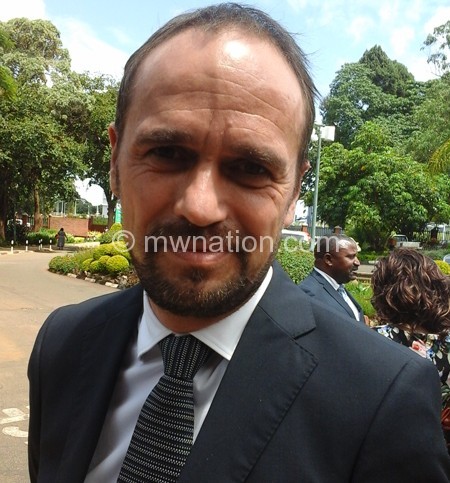EU wants follow-up on public private dialogue
Delegation of the European Union (EU) in Malawi has asked government to follow up on issues discussed during Public Private Dialogue (PPD) sessions if the country is to tackle challenges, including unreliable power supply, access to finance and Land-related Bills.
PPD forums are quarterly high-level meetings between government and the private sector.
Some of the issues discussed during the 19th PPD forum at Sunbird Capital in Lilongwe included the Tobacco Bill, Land-related Bills package, progress on the national identification system and power projects.
EU Ambassador Marchel Gerrmann, speaking in an interview at the end of the meeting, said his bloc and the World Bank will continue supporting high-level engagements between government and the private sector.
He said: “The agenda for the forum is the right one for government. What needs to be done is a proper follow up on issues that have a bearing on the affairs of the country.

“As EU and World Bank, we are happy with the dialogue in the forum and we intervened on policy reforms. We have seen that government is making strides on the control of goods and even the Land Bills.”
Gerrmann said the EU hopes President Peter Mutharika will assent to four Land-related Bills which were recently passed in Parliament, but have faced resistance from some quarters, including opposition political parties and some chiefs.
In his remarks, Minister of Industry, Trade and Tourism Joseph Mwanamvekha said the fora are important because they help government and the private sector to sort out challenges together.
The minister also asked commercial banks to review their interest rates, which have been cited in several fora as a stumbling block for businesses to access finance.
Mwanamvekha was reacting to an explanation by Malawi Confederation of Chambers of Commerce and Industry (MCCCI) chief executive officer Chancellor Kaferapanjira, who said the Reserve Bank of Malawi (RBM) believes that the way the policy rate is set is currently good for the country.
He said: “We have asked the governor [of RBM] to consider the way the policy rate is set by considering the private sector, but the governor has told us that things are they are OK and he could not move on our request.”
Naturally, Mwanamvekha defended the governor, saying the main issue is the way banks charge their interest rates, observing that RBM policy rate stands at 27 percent and that commercial bank lending rates needed to be in the range of 30 percent and not 40 percent as is the case now.
On the national ID system by the National Registration Bureau, the meeting learnt that 5 800 Malawians have registered and that by December this year, about 90 000 Malawians will have been registered and be supplied with IDs.





